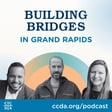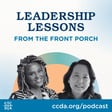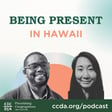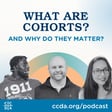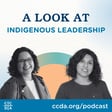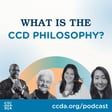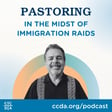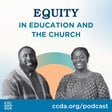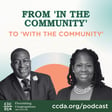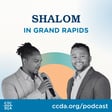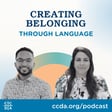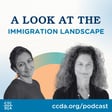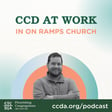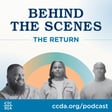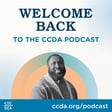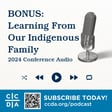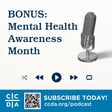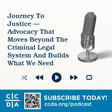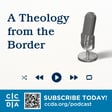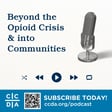Become a Creator today!Start creating today - Share your story with the world!
Start for free
00:00:00
00:00:01

Brown Church
The CCDA Online Institute & Missio Alliance partner to present, “Brown Church: Five Centuries of Latina/Latino Social Justice, Theology, & Identity.” Join us to learn more about the history and theology of Latino/Latina culture and what Robert Chao Romero’s newest book calls “Brown Church.” Romero considers how this movement has responded to these and other injustices throughout its history by appealing to the belief that God’s vision for redemption includes heavenly promises and the transformation of every aspect of our lives and the world. Lisa Rodriguez-Watson will guide our conversation with Robert Chao Romero about how his Chinese-Mexican experience has impacted his life & faith.
Transcript
Webinar Introduction
00:00:03
Speaker
And welcome to the CCDA podcast.
00:00:05
Speaker
In today's episode, a conversation about Brown Church, five centuries of Latina, Latino social justice, theology and identity with Robert Chow Romero.
00:00:16
Speaker
Hosting our conversation is Lisa Rodriguez Watson.
00:00:20
Speaker
We join them for this webinar.
00:00:21
Speaker
Welcome folks to CCDA Institute's webinar for the month of June.
00:00:28
Speaker
My name is Lisa Rodriguez Watson and I am delighted to get to host and facilitate today's conversation with Robert Chao Romero.
00:00:36
Speaker
Bula, good to see you.
00:00:37
Speaker
Hi Cheryl from LA.
00:00:39
Speaker
I'll let you guys continue all of your welcomes in your chats just to in the interest of time and to make sure that we have
00:00:48
Speaker
plenty of good conversation with Robert and a chance to hear fullest from him.
00:00:53
Speaker
I'm going to go ahead and move us into the content of our webinar today.
00:00:58
Speaker
Again, my name is Lisa Rodriguez Watson and I am the Director of Leadership Development and Training Department at CCDA.
Engagement and Book Promotion
00:01:06
Speaker
If you don't follow us yet on social media, I would love to invite you to follow us at I am CCDA on Facebook, Instagram, and Twitter.
00:01:14
Speaker
Also, would love to let you know that today, as a special offer for being part of this webinar, you can get 30% off and free shipping on Robert's book, The Brown Church.
00:01:26
Speaker
So you can use the code OFFER20S.
00:01:29
Speaker
We'll go ahead and drop that in the chat for everybody.
00:01:34
Speaker
And feel free to use that code at ivypress.com.
Introducing Robert Chao Romero
00:01:39
Speaker
All right, so I have the grand pleasure of getting to introduce Robert Chao Romero, a close friend of the work of CCDA and someone who's been a really important voice for us over the last several years.
00:01:51
Speaker
Reverend Dr. Robert Chao Romero is an Asian Latino and has been a professor of Chicano, Chicana studies at Asian American studies at UCLA since 2005.
00:02:03
Speaker
He received his PhD from UCLA in Latin American history and is Juris Doctor from UC Berkeley and is also an attorney.
00:02:14
Speaker
Romero has published 15 academic books and articles on issues of race, immigration, history, education, and religion, and he received the Latina O Studies Book Award from the International Latin American Studies Association.
00:02:29
Speaker
He's also an InterVarsity Press author, is a former Ford Foundation and UC President's postdoctoral fellow, as well as a recipient of the Louisville Institute's sabbatical grant for researchers.
00:02:42
Speaker
Robert is an ordained pastor.
00:02:44
Speaker
Together with his wife, Erica, he's the co-founder of Jesus for Revolutionaries, a Christian ministry to activists.
00:02:50
Speaker
as well as the co-chair of the Matthew 25 movement in Southern California.
00:02:54
Speaker
It's a joy and a privilege to have you with us today, Robert.
00:02:58
Speaker
Thank you so, so much for being part of this webinar.
00:03:01
Speaker
I'm honored to be here, Lisa, and thanks CCDA.
00:03:05
Speaker
As I saw all the different places where people are watching from, it got me really nervous.
00:03:10
Speaker
But CCDA is my peeps, and there's a lot of different orgs out there.
00:03:15
Speaker
But my heart, I think, definitely is closest to CCDA.
00:03:19
Speaker
So, honored to be here.
00:03:21
Speaker
Yeah, thanks.
The Journey to 'Brown Church'
00:03:23
Speaker
Well, let's go ahead and jump in.
00:03:25
Speaker
So, you know, we heard in your bio that you've published numerous books over the years.
00:03:31
Speaker
Share with us a bit of your story and why you decided to write Brown Church at this season of your life.
00:03:39
Speaker
Sure.
00:03:41
Speaker
Well, I never would have imagined writing Brown Church.
00:03:44
Speaker
Just a little bit about my testimony.
00:03:46
Speaker
when I went to law school many years ago, I thought I was on track to become a rich corporate lawyer, drive a Ferrari, be rich and famous and all that kind of stuff.
00:03:54
Speaker
And that's where Jesus got a hold of my life radically and changed everything.
00:03:59
Speaker
And from there, it was a journey of discernment and I felt Jesus kind of putting in my heart the vision to become a professor and to use that platform to address issues of race and Christianity.
00:04:14
Speaker
And so,
00:04:16
Speaker
I started at UCLA with that vision, but my original research had nothing to do with Brown Church.
00:04:23
Speaker
But for the first maybe eight to 10 years of my time as a professor, I was doing ministry with Erica, working with activist students, community development work and advocacy.
00:04:34
Speaker
But my academic research was all about Asians in Latin America.
00:04:38
Speaker
That's like my first book and my first work was all about Asians in Latin America.
00:04:42
Speaker
But after I got tenure, praise Jesus,
00:04:45
Speaker
I was listening to a Lauryn Hill song.
00:04:49
Speaker
It was a Lauryn Hill MTV album.
00:04:52
Speaker
Okay.
00:04:53
Speaker
Where she kind of comes out of the closet, the Christian closet.
00:04:55
Speaker
And I'm like, and in interlude five, Lauryn Hill says, I'm tired of leaving two thirds of myself outside the door.
00:05:03
Speaker
And so at that point I'm, I said, I'm tired of leaving two thirds of myself outside of the academic door.
00:05:08
Speaker
And I want to work on a project that brings together, you know,
00:05:12
Speaker
in an appropriate way, my academic research, my ministry, advocacy, and who I am.
00:05:18
Speaker
And that led to the journey of the Brown Church.
00:05:20
Speaker
Wow,
Theological Foundations of 'Brown Church'
00:05:21
Speaker
that's great.
00:05:21
Speaker
Your book sets up a theological foundation in the first chapter that may reframe for some the good news of Jesus.
00:05:30
Speaker
It's called El Plan Espiritual de Galilei.
00:05:33
Speaker
So tell us a little bit about that and how would you think that it might reframe?
00:05:39
Speaker
What is the plan and then how might it reframe for some folks?
00:05:44
Speaker
My context, you know, most of the time is in ethnic studies, Chicana, Chicano studies.
00:05:49
Speaker
I'm proud to say that we are the Cesar Chavez Department of Chicana, Chicano studies and Central American studies now, which is great.
00:05:57
Speaker
But within the context of ethnic studies, most people have only heard a fatally flawed gospel.
00:06:04
Speaker
They've only heard the gospel that says, oh, yeah, Jesus is the God of white colonizers who went around the world for 500 years.
00:06:12
Speaker
and genocided Native Americans and enslaved people and the God of Donald Trump.
00:06:19
Speaker
That's the only, that's the gospel that they've heard, sadly.
00:06:23
Speaker
And of course it's fatally flawed and unbiblical and everything, but sadly, historically, it's 80% true.
00:06:32
Speaker
80% true.
00:06:33
Speaker
For the last several hundred years at least, again, the gospel that most of my colleagues have heard is that Jesus came,
00:06:42
Speaker
to forgive us of our personal sins so that we might know Jesus and go to heaven when we die.
00:06:47
Speaker
Now, each of those individual pieces are okay, are fine.
00:06:51
Speaker
I mean, thank God for Jesus dying on the cross for my personal sins and God's grace is overwhelming and has transformed me.
00:06:59
Speaker
And I look forward to heaven when I die.
00:07:01
Speaker
But that's just an incomplete gospel because that gospel allows most of life on planet earth to be untouched.
00:07:09
Speaker
You can believe that limited gospel and still commit genocide.
00:07:12
Speaker
You can believe that limited gospel and still leave all of our schools inequitable and leave, you know, inequitable access to healthcare and so on and so forth.
00:07:20
Speaker
Right.
00:07:21
Speaker
But that's the only gospel that most of my colleagues have heard.
00:07:24
Speaker
So to reiterate, those aspects of personal relationship with Jesus and forgiveness in heaven are critically important, but it's not the complete picture.
00:07:33
Speaker
It's not the message that Jesus preached.
00:07:35
Speaker
Right.
00:07:35
Speaker
And, um,
00:07:37
Speaker
In Chicano-Chicano studies, or in the movement of the Chicano movement, there was something called El Plan Espiritual de Aslan.
00:07:45
Speaker
El Plan Espiritual de Aslan.
00:07:47
Speaker
And that was the Chicano Movement Manifesto, the Mexican-American Civil Rights Movement Manifesto of the 1960s.
00:07:53
Speaker
And I thought to myself, in writing this book, did Jesus have a manifesto?
00:07:57
Speaker
Did Jesus have a plan?
00:07:59
Speaker
And that got me thinking about, you know, how could you frame the gospel in a biblically faithful way, right, as a manifesto?
00:08:06
Speaker
Right.
00:08:07
Speaker
And I called it El Plan Espiritual de Galilee.
00:08:10
Speaker
And if you look at Mark chapter one, I'm going to read some very familiar words from Mark chapter one.
00:08:18
Speaker
It says, Jesus went into Galilee proclaiming the good news of God.
00:08:24
Speaker
The time has come, he said.
00:08:26
Speaker
The kingdom of God has come near.
00:08:28
Speaker
Repent and believe the good news.
00:08:31
Speaker
And as I reflected upon that very familiar passage, I thought,
00:08:35
Speaker
Gosh, what's behind that historically that has gotten lost over the years?
00:08:39
Speaker
So let me walk through some of those key concepts and sort of the framing of the gospel as El Plan Espiritual de Galilee, the Manifesto of Galilee.
00:08:50
Speaker
So it says Jesus went into Galilee.
00:08:52
Speaker
Let's just stop right there.
00:08:54
Speaker
What Latino, Latino theologians have told us is that Galilee in its day was the hood.
00:09:01
Speaker
Galilee was the hood of Jesus's day.
00:09:04
Speaker
Galilee was where
00:09:05
Speaker
The people there were looked down upon for being mestizo, for being culturally mixed race, for being bilingual.
00:09:12
Speaker
They spoke Aramaic.
00:09:14
Speaker
They probably had to learn some Greek.
00:09:17
Speaker
They had to learn Hebrew for religious purposes.
00:09:20
Speaker
They lived encroached upon by Roman and Greek sort of cultural forces, historical gentrification, if you will.
00:09:30
Speaker
The centers of religious, political, economic authority were in Jerusalem.
00:09:35
Speaker
And people from Jerusalem looked down upon the people of Galilee, right?
00:09:40
Speaker
And especially of Nazareth, right?
00:09:42
Speaker
And you could spot someone who was Galilean because they spoke with an accent, right?
00:09:47
Speaker
So Galilee back then was East LA.
00:09:50
Speaker
It was the hood of Florida.
00:09:54
Speaker
It was the hood of New York.
00:09:58
Speaker
And so first of all, you know, Galilee, like when God came in human flesh,
00:10:03
Speaker
and came to walk upon this earth to embody human flesh, it was not an accident that he did it.
00:10:09
Speaker
He chose to do it as a Galilean, as a person, a marginalized person.
00:10:14
Speaker
And one brown theologian, Virgilio Elizondo, he called this the Galilee principle, the Galilee principle.
00:10:23
Speaker
And the Galilee principle is this.
00:10:26
Speaker
Those that human beings reject, God calls his very own.
00:10:31
Speaker
So wonderful.
00:10:32
Speaker
Again, I keep saying it over and over all day.
00:10:35
Speaker
Those that human beings reject, God calls his very own.
00:10:38
Speaker
So it says, Jesus went into Galilee, went among those that human beings rejected, proclaiming the good news of God, proclaiming the good news of God.
00:10:49
Speaker
Now, good news, that term good news historically, it's so loaded.
00:10:54
Speaker
It's a super loaded term.
00:10:56
Speaker
We just say good news, good news today, like we don't have the context, but good news was limited to Caesar Augustus, right?
00:11:04
Speaker
Caesar of the greatest human empire that anyone's ever known, right?
00:11:09
Speaker
And good news, they'd say this, they'd be like, good news, we have a new emperor who's born.
00:11:14
Speaker
This emperor will bring peace and prosperity and salvation to the world.
00:11:19
Speaker
Good news, the Roman empire just destroyed, defeated its enemies in battle.
00:11:24
Speaker
And Jesus said, Jesus is proclaiming the good news of God.
00:11:29
Speaker
And the early church, the good news of God, know that Caesar is not Lord.
00:11:33
Speaker
Caesar is not the savior of the world.
00:11:35
Speaker
Caesar is not son of God.
00:11:36
Speaker
And those are all titles that Caesar appropriated for himself.
00:11:39
Speaker
No, Jesus is son of God.
00:11:41
Speaker
Jesus is Lord.
00:11:43
Speaker
Jesus is king.
00:11:43
Speaker
And only Jesus can bring true shalom.
00:11:46
Speaker
So the good news of God and proclaiming the good news of God, it's so subversive in this context.
00:11:52
Speaker
Um,
00:11:53
Speaker
Jesus went into Galilee, proclaiming the good news of God.
00:11:56
Speaker
The time has come, he said.
00:11:58
Speaker
The kingdom of God has come near.
00:11:59
Speaker
The kingdom of God has come near.
00:12:01
Speaker
Jesus is the Messiah of Israel and therefore Lord of the world.
00:12:06
Speaker
And through him and his kingdom, he has come to make us and the whole world
Historical Context and 'Borderlands Experience'
00:12:10
Speaker
new.
00:12:10
Speaker
Nothing, no one is left out.
00:12:13
Speaker
The kingdom of God, not just heaven when we die, as important as that is, the kingdom of God is Jesus making us and the whole world new now.
00:12:20
Speaker
And when Jesus comes again, praise God, that process will be completed.
00:12:25
Speaker
And then this last part, repent and believe the good news.
00:12:30
Speaker
Repent.
00:12:31
Speaker
I love this.
00:12:31
Speaker
I love this.
00:12:32
Speaker
Repent.
00:12:33
Speaker
Metanoeti in the Greek.
00:12:35
Speaker
Repent.
00:12:36
Speaker
Metanoia, new mind.
00:12:37
Speaker
Right.
00:12:39
Speaker
Repent.
00:12:40
Speaker
Get woke.
00:12:41
Speaker
Get woke.
00:12:42
Speaker
Conscientization, get a new mind.
00:12:47
Speaker
You're not going to change yourself according to the patterns of the world.
00:12:51
Speaker
You're not going to change the world according to the patterns of the world.
00:12:53
Speaker
You're going to change yourself as you allow the Holy Spirit and Jesus to transform us and all of our brokenness and frailty.
00:13:00
Speaker
And the world is going to be changed through Jesus and his methods of nonviolence and love of enemy and his death and resurrection on the cross.
00:13:08
Speaker
Repent, get woke.
00:13:09
Speaker
So it's like a new, it's a new kind of framing of repent, right?
00:13:14
Speaker
So once again, just to close, in light of this context, Jesus went into Galilee, the hood of his day,
00:13:20
Speaker
proclaim the good news of God.
00:13:22
Speaker
Jesus is Lord, not Caesar.
00:13:24
Speaker
The time has come, he said, the kingdom of God has come near to make us in the whole world new.
00:13:29
Speaker
Get woke and believe this good news.
00:13:32
Speaker
Yeah, I mean, that's so good.
00:13:34
Speaker
That is so good.
00:13:34
Speaker
And that's, that's the theological foundation for the rest of the book.
00:13:38
Speaker
And so I wanted to start out with that.
00:13:43
Speaker
So you write about the Borderlands experience.
00:13:46
Speaker
And, and that's part of a lot of what you talk about is a Borderlands experience.
00:13:51
Speaker
Tell us what, what is that and who might fit into that category?
00:13:57
Speaker
Sure.
00:13:57
Speaker
I think the best way to explain the borderlands experience is through a story or a parable or what we say in critical race theory, a critical race counter story.
00:14:08
Speaker
And I'll tell the story about Rosa.
00:14:10
Speaker
And Rosa is based upon the experience of a true person that I have met.
00:14:14
Speaker
And also it's based upon, it's a parable, different people that I've met.
00:14:19
Speaker
So Rosa grew up in the hood.
00:14:24
Speaker
And, you know, she was, imagine like,
00:14:27
Speaker
the top person in your youth group in the hood, right?
00:14:32
Speaker
Who's like smart, valedictorian, loves Jesus, right?
00:14:36
Speaker
Comes from an immigrant family.
00:14:38
Speaker
And Rosa went off to like one of the most prestigious liberal art colleges in the world.
00:14:47
Speaker
And of course, everyone's proud of her, right?
00:14:48
Speaker
Rosa did it, right?
00:14:50
Speaker
Then Rosa goes to her first Chicano studies class and her professor says,
00:14:57
Speaker
Christianity is a racist, classist, sexist religion.
00:15:00
Speaker
It's the religion of the colonizers who cannot care about justice.
00:15:10
Speaker
And it's a source of tens of Christians who care about justice.
00:15:18
Speaker
Then she went to find friends who are also first-generation college students, Latino, Latina, and they tell her the same thing.
00:15:25
Speaker
Then that launches Rosa into this experience of being in the borderlands, being in between on the one hand, the world of activism and justice and ethnic studies and the world of the Christian world she grew up in, right?
00:15:38
Speaker
She's stuck in between.
00:15:40
Speaker
She doesn't know what to do.
00:15:41
Speaker
And when I met Rosa, she was literally seen a psychiatrist for this deep dilemma that she was experiencing, being stuck in between.
00:15:49
Speaker
That's the borderlands.
00:15:50
Speaker
And so the borderlands, this Christian social justice borderlands, something that again, it's typified in that experience of first gen college students.
00:15:58
Speaker
But also I think in this historical moment, it's being experienced by millions of Christians of every ethnicity, millions, right?
00:16:05
Speaker
Like as we're like, as we were here and we're like, oh my gosh, I love Jesus.
00:16:11
Speaker
I'm part of CCDA.
00:16:12
Speaker
And how come my local church is saying that it's okay to say Kung flu, right?
00:16:18
Speaker
How come my local church is saying nothing about the George Floyd murderers?
00:16:21
Speaker
How come my local church said nothing when kids were put in cages, right?
00:16:24
Speaker
And so there's millions of us that are in between in this borderlands.
00:16:29
Speaker
And this book, Brown Church, is written for all of us in the borderlands to provide a sense of belonging, to say that if we're stuck in that middle, in between space, it's okay.
00:16:40
Speaker
We're not alone because the Brown Church has been stuck in that space for 500 years.
00:16:45
Speaker
following Jesus, hearing about justice.
00:16:47
Speaker
I know we'll talk a lot more about that, but the Brown Church has written to kind of bridge that gap.
00:16:54
Speaker
Yeah.
00:16:55
Speaker
Yeah.
00:16:55
Speaker
I think that's so helpful that, that liminal space, um, that so many of us occupy of, man, I, I am so grateful for the, the heritage of faith and for the faith that I have discovered or grown up with maybe from my own family experience.
00:17:09
Speaker
But what does that have to do?
00:17:10
Speaker
I mean, heaven is great one day, but what does that have to do with today?
00:17:13
Speaker
What does that have to do with my neighbor?
00:17:15
Speaker
What does that have to do with the human suffering that I see and that I experience every single day?
00:17:19
Speaker
And, um,
00:17:20
Speaker
And that Borderlands experience is really, really critical and does, just as you say, provide a space and a place for us to belong.
00:17:28
Speaker
And so does, too, the Brown Church.
00:17:30
Speaker
So, you know, in a really colorized, especially here in the United States, but this may be true more globally, but in a colorized world where we're racialized and colorized so much, I'd love for you to explain what is the Brown Church?
00:17:46
Speaker
What is her place and her work in the world?
00:17:51
Speaker
Who is the Brown Church and what is the Brown Church?
00:17:53
Speaker
Tell us a little bit about that.
00:17:56
Speaker
Amen.
00:17:56
Speaker
Amen.
00:17:56
Speaker
Sure.
00:17:58
Speaker
So at its simplest level, the Brown Church is the 500-year history of Latino, Latina, Christian social justice.
00:18:10
Speaker
500-year history of Latino, Christian social justice.
00:18:14
Speaker
Now, the Brown Church began in
00:18:20
Speaker
actually the Protestant Reformation when a priest by the name of Montes in the way had been enslaving natives on the Sunday before Christmas in 1511 he went to preach to draw that chapel to the Spanish elites on the island and he says the words I'm about to preach will be the strangest you've ever heard he says I am the voice crying out
00:18:49
Speaker
the wilderness and then he proceeds to say again in 1511 he says Spaniards your your exploitation enslavement of the natives is a sin against God if you do not repent God is going to send you to hell right and punish the whole Spanish nation right and that began the tradition of the brown church in 1511 again before Luther nailed his famous theses right before the Protestant Catholic divide since then
00:19:16
Speaker
The brown church in this 500 year tradition has challenged colonization, has challenged misogyny, even in the colonial period with Sor Juana y Ernesto de la Cruz, has challenged the US-Mexico war and the colonization of the church in the United States, has challenged Jim Crow segregation, has challenged the exploitation of immigrants and on and on and on, dictators in Latin America.
00:19:36
Speaker
But in general, before going into specifics, the brown church is this 500 year history.
00:19:41
Speaker
And so the brown church didn't start, I'm sorry, Christian social justice
00:19:46
Speaker
For us as Latinas and Latinos, it's not new.
00:19:48
Speaker
Right.
00:19:49
Speaker
It didn't start like in 2007 with some fancy evangelical conference.
00:19:54
Speaker
We've been wrestling with these issues and walking with Jesus for 500 years.
00:19:59
Speaker
So that's one definition of the Brown Church.
00:20:01
Speaker
I know that there's folks from Missio here, and Missio, like some of the nerdy kind of theological stuff, right?
00:20:07
Speaker
So I'll share a more academic definition too.
00:20:10
Speaker
The Brown Church, a prophetic ecclesial community of Latinos and Latinas,
00:20:16
Speaker
which has contested racial and social injustice in Latin America and the United States for the past 500 years.
00:20:24
Speaker
As such, Brown Church is a multivalent category, encompassing ethnic, historical, theological, spiritual, and socio-political dimensions.
00:20:35
Speaker
So that's Brown Church.
00:20:37
Speaker
Now, Brown, when I'm talking about Brown here, it's a metaphor for what you said before, that liminality.
00:20:42
Speaker
It's a metaphor, on the one hand, for
00:20:45
Speaker
cultural, ethnic, racial liminality.
00:20:47
Speaker
So liminality is like feeling in between, right?
00:20:50
Speaker
There's a great book written by Sung Hyun Lee, an Asian American professor at Princeton Theological Seminary that's called From a Liminal Place.
00:20:59
Speaker
And he's an Asian American ethicist.
00:21:03
Speaker
But liminality is this in-between space.
00:21:05
Speaker
And as Latinas and Latinos, we have been in between black and white in the United States.
00:21:12
Speaker
for the last several hundred years at least, right?
00:21:15
Speaker
Where when black and white come to the table to talk, we're left out, right?
00:21:20
Speaker
When social justice remedies are discussed, we're kind of an afterthought.
00:21:25
Speaker
When denominations and church institutions are being formed, again, we're kind of an afterthought, right?
00:21:31
Speaker
We're kind of in between.
00:21:32
Speaker
And so actually one way to kind of demonstrate this Brown is through a historical example.
00:21:40
Speaker
During the time of Jim Crow,
00:21:42
Speaker
During the time of Jim Crow segregation in the U.S., there was Latino segregation as well.
00:21:48
Speaker
So that's sort of, most people don't know about that.
00:21:50
Speaker
But we were segregated.
00:21:51
Speaker
Our kids were segregated into Mexican schools, Latino schools.
00:21:55
Speaker
We couldn't, certain communities, we couldn't, the school, local neighborhood, and parks.
00:22:03
Speaker
And in the courts, we'd say, again, picture it in the 1940s.
00:22:07
Speaker
We go to the judge and we say, judge, you cannot,
00:22:11
Speaker
The city of Pasadena cannot segregate our kids.
00:22:14
Speaker
The city of LA cannot segregate us into Mexican schools.
00:22:18
Speaker
But our legal argument of the time, 100 years ago, was you cannot segregate us because we're white, actually.
00:22:24
Speaker
That was the argument.
00:22:26
Speaker
But we're a special kind of white that still experiences discrimination.
00:22:30
Speaker
And the judges would sit there.
00:22:32
Speaker
The judges would call in expert witnesses from UCLA or USC or whatever, anthropologists, and say, are they white?
00:22:40
Speaker
The judge would listen to all the evidence for a couple of days and would say, I guess you're right.
00:22:44
Speaker
I guess they are white.
00:22:46
Speaker
But then we just go back to our communities, Pasadena, LA, wherever, and they'd still segregate us anyways, right, and discriminate against us.
00:22:54
Speaker
But they would just find, instead of legal ways, they would find kind of more social conventions and ways to discriminate against us, right?
00:23:01
Speaker
And so that's sort of a kind of a good example of what I mean by brown, this in-betweenness where
00:23:08
Speaker
Again, some of the privileges of whiteness, yet most of the time sort of still relegated to the edges.
00:23:14
Speaker
And in that same way, Jesus was brown in that same way.
00:23:19
Speaker
Jesus was brown in terms of the metaphor of Galilee.
00:23:23
Speaker
It's the metaphor and the historical Galilee that we talked about, right?
00:23:27
Speaker
In between Greek, Jewish, and Roman worlds, right?
00:23:31
Speaker
You know, part of Israel and Jerusalem get marginalized and so on and so forth, right?
00:23:37
Speaker
So brown is sort of a metaphor for that liminality.
00:23:40
Speaker
It's a metaphor also for, as Latinas and Latinos, our cultural mixture, right, our rich cultural mixture.
00:23:48
Speaker
So Latin America, we are so diverse, right?
00:23:51
Speaker
We have Asian, European, indigenous, African, Jewish, Middle Eastern, and every combination you can imagine, right?
00:23:58
Speaker
And brown is also a metaphor just for that mixture, not a literal brown,
00:24:02
Speaker
Because as Latinos and Latinos, we come in all shades, right?
00:24:06
Speaker
So it's not a literal brown, but more of a metaphor for that.
00:24:09
Speaker
I will next finally say that brown, it's not just for Latinos.
00:24:14
Speaker
Brown is a metaphor for anybody that feels in between.
00:24:17
Speaker
So as I've shared about this framework with my friends, for example, who are the Asian American community or the South Asian community, a lot of people resonate.
00:24:27
Speaker
They're like, oh yeah, I'm brown too, right?
00:24:29
Speaker
metaphorically.
00:24:30
Speaker
So anyways, like that's, that's the Brown church.
00:24:33
Speaker
And as I've shared that, that framework, I'm not the first to say Brown person to say Brown church, but this is a unique framework.
00:24:41
Speaker
I think that is by God's grace, original as I, as I've shared it, people have found a spiritual home.
00:24:49
Speaker
I want to share a quote here because there's thousands of Latinos and Latinas, maybe more, maybe millions who are
00:24:56
Speaker
Stuck in between in the brown, when they learn about the brown church, they're like, oh my gosh, I finally belong.
00:25:01
Speaker
So here's a quote from someone who read brown church and they said, I cried all night.
00:25:08
Speaker
No podía dejar el libro.
00:25:10
Speaker
I couldn't put the book down.
00:25:13
Speaker
I finally found a home.
00:25:16
Speaker
What's amazing is that that home has been there this whole time.
00:25:20
Speaker
Honestly, I've struggled so much all these years.
00:25:24
Speaker
While I'm fairly versed on liberation theology and other movements, I never considered the fact that other brown people are wrestling to find their place as Christians as I have.
00:25:35
Speaker
I woke up feeling so proud of being who God created me to be in such a time as this.
00:25:42
Speaker
Amen.
00:25:42
Speaker
And so that's, praise Jesus, like that's the brown church is a home for those many of us who have not had a home.
00:25:51
Speaker
We'll be right back.
00:25:52
Speaker
But first, a word from our sponsor.
00:25:54
Speaker
Hello, I'm Paul Miles, President and CEO of We Raise Foundation.
00:25:58
Speaker
We Raise invests in people and organizations that serve at the intersection of poverty, violence, and inequality.
00:26:04
Speaker
We start by acknowledging that change begins with we.
00:26:08
Speaker
We are in this together.
00:26:10
Speaker
And it's going to take our love and our compassion and dedication to solve the problems facing communities today.
00:26:16
Speaker
We invite you to be part of that with us and encourage you to visit WeRaise.org to find out how you can become involved and be a partner with WeRaise.
00:26:30
Speaker
I can imagine that all of the hours of research and writing and everything that surfaces when you put a work together, all of that labor was so worth it.
00:26:45
Speaker
I mean, I'm sure that it's not the only quote, but for that one quote, for that one person that says, I finally found pride in who I am, how God has made me to be, and a place to belong.
00:26:57
Speaker
It just brings me joy just to think about what that must have felt like for you and for that reader.
00:27:01
Speaker
So, wow, that's really beautiful.
00:27:04
Speaker
It gives me chills just even just thinking about it.
00:27:06
Speaker
I mean, that's what it's about.
00:27:08
Speaker
That's right.
00:27:09
Speaker
And that's like the, for me, the ultimate purpose of academia is
00:27:14
Speaker
is to be able to, I mean, to be able to use it for those types of purposes.
00:27:17
Speaker
That's what it's, that's what it's about.
00:27:19
Speaker
That's what it's about.
00:27:20
Speaker
Yeah, that's right.
00:27:22
Speaker
That's right.
Faith Deconstruction and Mission Integral
00:27:23
Speaker
So let's talk about, about deconstruction of faith for, for a few minutes, right?
00:27:29
Speaker
Because when we come to realize that, like maybe we haven't gotten the whole story on the gospel or the faith or the good news, but
00:27:38
Speaker
We often go through this process of deconstruction, and so many folks are actually deconstructing faith right now, and that is good, and it is right, and yet there is, while that is important, there also needs to be reconstruction.
00:27:56
Speaker
So what does healthy deconstruction and reconstruction look like as you think about it?
00:28:01
Speaker
Amen, and that is a big, one of my, it probably is my biggest pastoral concern
00:28:10
Speaker
it's what keeps me up at night is thinking about the fact that there is some unhealthy deconstruction happening and there's a very little reconstruction happening, very healthy.
00:28:21
Speaker
And that keeps me up at night.
00:28:25
Speaker
But one helpful thing I think about just the history of the Brown church is that we have been deconstructing and reconstructing for 500 years.
00:28:33
Speaker
So there's, there's a lot of hopeful examples of how we could do that in a way that will,
00:28:40
Speaker
in a way that at the end of the day by God's grace we will be stronger than ever and so one example is from Latin America in the 1960s and 70s and 80s called Mission Integral or Integral Mission Integral Mission and I'll just tell a story about it and you know folks can
00:29:03
Speaker
learn more about it.
00:29:04
Speaker
But key figures in this story of Mission Integral are Rene Padilla, Rene Padilla, Samuel Escobar, and many others, but those are some of the key folks.
00:29:14
Speaker
And Padilla and Escobar, they worked for InterVarsity, right?
00:29:20
Speaker
InterVarsity, and they were kind of helped found InterVarsity in Latin America.
00:29:25
Speaker
As a side note, my Chinese grandparents founded InterVarsity in China in the 1930s, but it's a different story.
00:29:33
Speaker
And Padilla and Escobar and others like part of Latin America IFES, many of them trained in the United States.
00:29:44
Speaker
So like Padilla went to Wheaton and got an undergrad and grad degree at Wheaton.
00:29:50
Speaker
They probably went through all the different intervarsity trainings.
00:29:53
Speaker
And they received a lot of good things.
00:29:55
Speaker
And I'm to this day very close to intervarsity.
00:29:59
Speaker
But they received a lot of good things, but they received a very individualistic gospel.
00:30:04
Speaker
a very individualistic American gospel of the good news of Jesus's transformation of us as individuals, but very little about Jesus's transformation of society.
00:30:14
Speaker
So they went back to Latin America, they went back to Peru and Ecuador and all over the place.
00:30:20
Speaker
And they shared this individualistic gospel with their students.
00:30:24
Speaker
And the students were like, chale, man, like, you know, what is this?
00:30:28
Speaker
That's just my own, that's just my own elaboration in Chicano Spanish.
00:30:32
Speaker
But, but, but, but they're like,
00:30:34
Speaker
what does this individualistic gospel have to do with the fact that my uncle just disappeared yesterday, right?
00:30:39
Speaker
And my whole community has nothing to eat.
00:30:42
Speaker
And there's all this big, huge gap between rich and poor and these dictators funded by American government.
00:30:50
Speaker
And then Escobar and Padilla, they kind of had to, they reflected upon that, right?
00:30:56
Speaker
And they said, oh my gosh, we need to deconstruct the American individualistic gospel that has been exported to Latin America.
00:31:04
Speaker
take what's good, but reconstruct it based upon our own situational context, right?
00:31:11
Speaker
But in a way that keeps Jesus at the center, in a way that is guided by God's word, right?
00:31:17
Speaker
And some of their deconstruction, I'll just share some quotes that are super powerful.
00:31:23
Speaker
And these are hard words, but sadly, they very much apply to our experience in the US right now.
00:31:30
Speaker
And keep in mind, this is in the 60s and the 70s that they're saying this.
00:31:35
Speaker
Here's one quote.
00:31:37
Speaker
According to American cultural Christianity, quote, the racist can continue to be a racist.
00:31:43
Speaker
The exploiter can continue to be an exploiter.
00:31:50
Speaker
U.S. culture Christians were the kind of people who, quote, opposed the violence of revolution, but not the violence of war.
00:31:58
Speaker
You could say in the U.S. who opposed the violence of protests.
00:32:03
Speaker
but not the violence of police brutality, right?
00:32:06
Speaker
And quote, condemn all the sins that well-behaved middle-class people condemn, but say nothing about exploitation, intrigue, and dirty political maneuvering done by great multinational corporations around the world.
00:32:21
Speaker
So it's like, that's more relevant than ever, right?
00:32:23
Speaker
But again, they're going through this deconstruction in the 60s and the 70s.
00:32:25
Speaker
Padilla and Escobar, they used another metaphor.
00:32:30
Speaker
It's harsh, but it's true.
00:32:32
Speaker
they called it ropa anglo-sajon anglo-saxon cultural clothing and they said that the gospel that they had been received in latin america was clothed in anglo-saxon cultural clothing and not all that is bad but when it led to those horrible when it led to the perpetuation of racism then it's bad right and so um escobar and paria and others
00:32:58
Speaker
They gathered a group of Latin American theologians and pastors and ministry leaders in Cochabamba, Bolivia in 1970.
00:33:06
Speaker
And they met for several days and they processed this.
00:33:09
Speaker
They said, what do we do with all this?
00:33:11
Speaker
How can we create a theological framework?
00:33:15
Speaker
Again, that's for the whole church, but it's also for us, right?
00:33:20
Speaker
And they came up with this notion of mission integral, integral mission or holistic mission.
00:33:28
Speaker
And Mission Integral is the mission of the whole church to the whole of humanity and all of its forms, personal, communal, social, economic, ecological, and political.
00:33:40
Speaker
In other words, it's just a biblical gospel.
00:33:43
Speaker
Like the kingdom of God transforms everything and everyone, right?
00:33:46
Speaker
Nothing's left out.
00:33:47
Speaker
And they use this metaphor of two wings of a plane.
00:33:53
Speaker
They said the gospel is like
00:33:56
Speaker
or biblical mission is like two wings of the plane.
00:33:59
Speaker
On the one hand, you have the verbal proclamation of the good news of Jesus.
00:34:03
Speaker
On the other hand, you have the embodiment of that good news in justice, mercy, compassion, right?
00:34:13
Speaker
On the one hand, you know, we have a personal relationship with God.
00:34:21
Speaker
On the other hand, we have to love our neighbors, so on and so forth.
00:34:23
Speaker
And if one is missing, the plane is not going to fly, right?
00:34:26
Speaker
And in most U.S. churches, I think today, in most U.S. churches today, one wing or the other is missing.
00:34:32
Speaker
And you need both, right?
00:34:33
Speaker
You need both.
00:34:35
Speaker
And what's happening now is I think the plane, the gospel plane in the U.S. is crashing.
00:34:41
Speaker
Everyone's bailing out, right?
00:34:43
Speaker
And we're like, right?
00:34:44
Speaker
And I think that Mission Integral has a wonderful, wonderful...
00:34:51
Speaker
message, wonderful, instruct and reconstruct in a healthy way.
00:34:55
Speaker
And it's been proven.
00:34:55
Speaker
Again, you're talking about the 1960s and 70s here.
00:34:59
Speaker
And I want to sort of also, before I, while I'm on this, just talk about the amazing examples of Latina theology and Latin American female theologians like Elizabeth Conde Frazier, like Ruth Padilla de Boer's,
00:35:16
Speaker
who have also been developing these amazing theological frameworks that are important for the whole church and also in relationship to the expression of women in the global church, right, and the U.S. church, and also Maria Isasi Diaz.
00:35:40
Speaker
And so there's this whole
00:35:42
Speaker
treasure of Latina theology and Latin American female theology, womanist theology that I encourage everyone to listen to.
00:35:48
Speaker
And I'll just close this part by saying like, according to Latina theologians, God has a preferential option for women.
00:35:59
Speaker
God has a preferential option for women in a world that is broken and fractured by sin.
00:36:04
Speaker
Men take advantage of women and abuse women and
00:36:07
Speaker
God does not stand for that.
00:36:10
Speaker
And God takes the side of women in their oppression.
00:36:14
Speaker
Wow, that's powerful.
00:36:16
Speaker
Thank you.
Cultural Integration in Institutions
00:36:18
Speaker
How do we reconstruct on an institutional level?
00:36:21
Speaker
You and I had talked before about community cultural wealth.
00:36:26
Speaker
Keeping in mind that we want to leave plenty of time for our Q&A, is there a way for you to be able to address that revelations passage that you and I spoke of and talk about community cultural wealth?
00:36:38
Speaker
Sure.
00:36:39
Speaker
I can do that in a concise way.
00:36:41
Speaker
I'm
00:36:41
Speaker
So Revelation 21 verses 26 and 27 are some of my favorite passages.
00:36:47
Speaker
In that passage, John is describing the new Jerusalem, right?
00:36:51
Speaker
After Jesus comes back and makes all things new, what is that going to look like?
00:36:55
Speaker
And in verse 26, he says that the glory and honor of the nations will be brought into the new Jerusalem forever.
00:37:03
Speaker
The glory and honor of the nations.
00:37:05
Speaker
The community cultural wealth of every ethnic group will be brought in and
00:37:11
Speaker
Typically, in our Christian institutions, the glory and honor, the community cultural wealth of different ethnic groups is not reflected in the leadership.
00:37:22
Speaker
It's not reflected in the curriculum.
00:37:24
Speaker
It's not reflected in virtually anything.
00:37:28
Speaker
Instead, based upon historical racism, people tend to view us minority communities as just being culturally deficient.
00:37:40
Speaker
that we just have a cultural deficit as Latinos, as African Americans, as Asian Americans.
00:37:45
Speaker
And in order to reform our institutions, we need to make everybody middle-class white Americans.
00:37:50
Speaker
I'm just being real, right?
00:37:52
Speaker
And that as long as our institutions, Christian institutions, reflect the values and culture of middle-class white America, that's the solution.
00:37:59
Speaker
That's why we're in this mess, right?
00:38:00
Speaker
And so we need to, by God's grace, invite leaders of color into these institutional spaces so that the gospel and the deconstruction and the reconstruction can take place
00:38:10
Speaker
with the full breadth of the community cultural wealth of the kingdom of God.
00:38:14
Speaker
Yeah, that's true.
00:38:15
Speaker
So, so good.
00:38:17
Speaker
Hi, my name is Christina Fore.
00:38:19
Speaker
And what I love about CCDA is that our faith is part of communities flourishing.
00:38:26
Speaker
Welcome to the CCDA podcast.
Q&A Session on 'Brown Church'
00:38:30
Speaker
I've got a few questions.
00:38:31
Speaker
We're going to start Q&A.
00:38:32
Speaker
That first question actually was from Diana and it was the definition for Brown Church, I think.
00:38:44
Speaker
The definition for Brown Church.
00:38:46
Speaker
Can we drop that in the chat?
00:38:49
Speaker
And I'm happy to restate it too.
00:38:51
Speaker
You want to restate it?
00:38:52
Speaker
Yeah, why don't you restate it?
00:38:53
Speaker
We did drop a link in that is to brownchurchmovement.org.
00:38:58
Speaker
Sure.
00:38:59
Speaker
But yeah, let's hear it again.
00:39:03
Speaker
So the simple definition, and then I'll say the more elaborate one is the Brown Church is the 500-year Latino, Latina, Christian social justice tradition.
00:39:18
Speaker
So the 500-year Latino, Latina, Christian social justice tradition, the more elaborate one is a prophetic ecclesial community of Latinas and Latinos, which has contested racial and social injustice in Latin America and the U.S. for the past 500 years.
00:39:37
Speaker
Brown Church is a multivalent category, multivalent category, encompassing ethnic, historical, theological, and
00:39:48
Speaker
spiritual and socio-political dimensions.
00:39:53
Speaker
Thank you.
00:39:54
Speaker
I didn't catch every word of that.
00:39:56
Speaker
Where can we find that?
00:39:58
Speaker
Is it somewhere in your book?
00:40:00
Speaker
And I can maybe have someone do some research and drop it back in an email.
00:40:03
Speaker
Yeah.
00:40:03
Speaker
Oh yeah, it's in the book for sure.
00:40:04
Speaker
Chapter one.
00:40:05
Speaker
And yeah, it's on page.
00:40:08
Speaker
I'll just find it right here.
00:40:12
Speaker
I'll find it, but we can move on and I'll find the page.
00:40:14
Speaker
Yeah, okay, perfect.
00:40:15
Speaker
That's fine.
00:40:17
Speaker
And yeah, thank you for that.
00:40:19
Speaker
All right, here we go.
00:40:20
Speaker
The two winners of our book giveaway, Sylvia Comande and Tiffany Gonzalez.
00:40:25
Speaker
Yay, congratulations.
00:40:26
Speaker
I wish I had a sound machine.
00:40:27
Speaker
I would push a button and everything would sound really fun like a game show.
00:40:32
Speaker
So congratulations to you guys.
00:40:35
Speaker
Email me, lwatson at ccda.org.
00:40:38
Speaker
Send me your address and I'll get the books out to you.
00:40:41
Speaker
Okay, question number one.
00:40:43
Speaker
Where would you recommend starting if we want to learn more about the Brown Church's history or liberation theology, et cetera?
00:40:50
Speaker
Sure.
00:40:52
Speaker
So, and this is not just self-promoting, but like the Brown Church book has, it's intended, it's an introduction and overview of all of this that we're talking about.
00:41:03
Speaker
So it says like, okay, it's kind of, again, it's like,
00:41:06
Speaker
it'll tell you, this is how liberation theology started.
00:41:08
Speaker
This is how Mission Integral started.
00:41:10
Speaker
These are a few key authors.
00:41:13
Speaker
These are a few key books.
00:41:14
Speaker
So, Brown Church, if you want to learn about, try to think of, like, liberation theology, and again, that's as a formal concept.
00:41:25
Speaker
There's a book by Leonardo Boff, B-O-F-F, you know, Brazilian theologian, and he has a great book that's an introduction book
00:41:35
Speaker
to liberation theology.
00:41:36
Speaker
And all those, I quote from all of them here.
00:41:38
Speaker
So, I mean, I would look at the bibliography of Brown Church as an example.
00:41:43
Speaker
And I'm happy to post the whole bibliography, but in terms of like Latin American liberation or Latin American, like, again, look up, it's very easy to look up the writings of Samuel Escobar, Rene Padilla, in terms of, again,
00:42:01
Speaker
There's specifically Latino, Latina theology from the U.S. That's in the U.S. context.
00:42:06
Speaker
It's like 40 years old.
00:42:08
Speaker
Read Justo Gonzalez.
00:42:10
Speaker
Many have heard of Justo Gonzalez.
00:42:13
Speaker
Read Elizabeth Conde Frazier and Lloyda Martel Otero and others.
00:42:18
Speaker
An amazing book is called Latina Evangelicas.
00:42:21
Speaker
Latina Evangelicas is an amazing book.
00:42:23
Speaker
Oh, my gosh.
00:42:24
Speaker
It's a deconstruction and reconstruction of theology from a Latina Evangelica Pentecostal perspective.
00:42:31
Speaker
amazing work.
00:42:33
Speaker
Those would be some of the places that I would start.
00:42:34
Speaker
But again, like Brown Church, like as a resource, it refers to all those, many of the, most of the key titles.
00:42:40
Speaker
Yeah, cool.
00:42:42
Speaker
That's perfect.
00:42:42
Speaker
That actually answers a couple of questions for us because you've named some names and some folks have asked, who are some of these other folks that we should be reading and, you know, connecting with to educate ourselves?
00:42:56
Speaker
Here we go.
00:42:58
Speaker
Naomi, thanks for this question.
00:42:59
Speaker
Hi there.
00:43:00
Speaker
I loved the talk and received your book this week.
00:43:01
Speaker
Well done, Naomi.
00:43:03
Speaker
I haven't read it yet.
00:43:04
Speaker
Don't worry, there's time.
00:43:05
Speaker
I've seen there's a chapter on Mexico and Guadalupe.
00:43:09
Speaker
Feminist philosophers like Gloria Anzaldúa emphasize the cultural mestizaje and even syncretism of this figure are an important part of post-colonial resistance to a form of religion that was very totalizing.
00:43:21
Speaker
So I'm really interested in your thoughts on syncretism generally in relation to Brown church theology.
00:43:27
Speaker
Oh, that's a good one.
00:43:27
Speaker
It's a good one.
00:43:29
Speaker
Yeah.
00:43:30
Speaker
Syncretism is such a loaded word, right?
00:43:33
Speaker
Syncretism is such a loaded word.
00:43:35
Speaker
So I would, I would say that I would talk about like, I mentioned a revelation 21, the glory and honor of the nations, the glory and honor of the nations.
00:43:44
Speaker
And maybe it gives me a chance to elaborate a little bit more on that.
00:43:47
Speaker
So by God's design,
00:43:49
Speaker
I think from a biblical perspective, every ethnic group has cultural wealth, cultural glory and honor that is God ordained, God created even.
00:44:01
Speaker
So I can think about like, you know, what's some of the glory and honor of my Mexican culture?
00:44:07
Speaker
Well, I think that there's this incredible like sort of cohesiveness, like beautiful interrelatedness of the family and of like sort of a corporate sort of
00:44:19
Speaker
The beauty there, there is a certain way of understanding the world, seeing the world of certain perspective.
00:44:25
Speaker
There is, of course, all the tangible aspects of culture that is glory and honor, you know, from the food to the music, right?
00:44:33
Speaker
But there's this concept of glory and honor, and every ethnic group has glory and honor, right?
00:44:38
Speaker
That's, again, Revelation 21, 26.
00:44:42
Speaker
Revelation 27, though, says, even though all the glory and honor is going to come in, 27 says,
00:44:49
Speaker
that nothing that causes sin will be brought in.
00:44:51
Speaker
Nothing that causes sin will be brought in.
00:44:53
Speaker
So in my understanding, I think that every ethnic group has distinct glory and honor, but also distinct sin.
00:45:01
Speaker
So I'm so thankful that machismo is not going to make it in, but the glory and honor of my Mexican culture, Latino culture is going to make it in, right?
00:45:10
Speaker
I'm thankful that the glory and honor of my Chinese culture is going to make it in, but not the sin, the glory and so on and so forth.
00:45:17
Speaker
Right.
00:45:18
Speaker
And I think that
00:45:20
Speaker
when Christianity is viewed as it's just this Western religion that comes in and takes over, that's not a biblical understanding of what the good news is, right?
00:45:30
Speaker
I think a biblical framework, so I understand like Anzaldua and others are saying when they say that, but I think like a biblical view is the good news of Jesus, right?
00:45:42
Speaker
The good news that came from Galilee, from the hood of Jesus's day, right?
00:45:46
Speaker
From the marginalized people
00:45:47
Speaker
Galilean Jesus, the colonized Jesus, comes into a new community, starting with the poorest and most marginalized, and gives hope to the poorest and the marginalized, right?
00:45:57
Speaker
The kingdom of God in Jesus.
00:45:59
Speaker
Not the colonial master coming and forcing it, right?
00:46:04
Speaker
But when the gospel comes the way that Jesus brought it, and the early church brought it first to the poor and then to everybody else, and gives hope and life,
00:46:13
Speaker
then the kingdom of God begins to express itself in new ways through the distinct glory and honor of that new culture, that people.
00:46:23
Speaker
And that glory and honor shines more brightly than ever.
00:46:26
Speaker
And Jesus sanctifies that culture of its sin because we all have sin.
00:46:30
Speaker
So I think that, so I understand the framing of like, you know, Christian, you know, European colonizers bringing the gospel in,
00:46:40
Speaker
to Latin America and then syncretism as a way of sort of being sort of a, you know, a rebellion.
00:46:46
Speaker
But again, I think that that's not the way that I see the gospel, the way it's supposed to act, the way it's supposed to manifest itself.
00:46:54
Speaker
Right.
00:46:55
Speaker
Oh, that's good.
00:46:56
Speaker
That's good.
00:46:57
Speaker
All right, we've got another question here.
Role of 'Brown Church' in Community Revival
00:47:00
Speaker
This will be really hard for our white brothers and sisters to hear.
00:47:04
Speaker
How would you recommend this resource, your book, being used in teaching, discipling, and leading white brothers and sisters?
00:47:12
Speaker
So which part will be really hard?
00:47:14
Speaker
Well, I don't know.
00:47:14
Speaker
It doesn't say right there.
00:47:16
Speaker
I can take a guess, Ed.
00:47:18
Speaker
I would say that the Brown Church book, the goal of the Brown Church is the beloved community.
00:47:25
Speaker
It's about...
00:47:26
Speaker
you know, how can we all the different ethnic groups of the world be united and all of us bringing our glory and honor to the table, our dignity, our so forth, right?
00:47:37
Speaker
So the Brown Church is not a nationalistic book.
00:47:39
Speaker
It's not an ethnocentric book, but it's simply saying, we're God's children too, and come learn about how God has, you know, and, but it's just, it's a different entryway to the beloved community.
00:47:51
Speaker
It's a different entryway.
00:47:52
Speaker
And typically, honestly,
00:47:54
Speaker
The entryways to the beloved community so far in U.S. history have been through the white church.
00:47:58
Speaker
But we've hit a wall.
00:48:01
Speaker
We can't get to the beloved community using the methods of the white church because we've hit a wall.
00:48:07
Speaker
Like, we can't get past it anymore, right?
00:48:09
Speaker
And so that's where the body of Christ comes in.
00:48:11
Speaker
We're all the body of Christ, right?
00:48:12
Speaker
We need one another.
00:48:13
Speaker
We belong to each other.
00:48:14
Speaker
And as another part of the body of Christ, we're saying, here, here's this 500-year history of how we have known and followed God.
00:48:22
Speaker
And the whole body of Christ can learn and we learn just as we learn from the rest of the body of Christ.
00:48:28
Speaker
Yeah, that's good.
00:48:29
Speaker
That's a good word.
00:48:33
Speaker
Another question we have here.
00:48:34
Speaker
Can you give a few examples of what would be considered values and cultural characteristics of white middle class America?
00:48:41
Speaker
Values and characteristics?
00:48:42
Speaker
Okay.
00:48:44
Speaker
So...
00:48:44
Speaker
Earlier I spoke about like sort of glory and honor versus sin of individual cultures.
00:48:49
Speaker
I'm not sure if they're wanting me to sort of tie those two together or just say some of the values.
00:48:55
Speaker
But I think maybe you made like in order for us to sort of represent Christianity, it looks like everybody should just middle class evangelical culture.
00:49:08
Speaker
What do you mean specifically when you say that?
00:49:10
Speaker
Okay.
00:49:11
Speaker
I'll give an example.
00:49:12
Speaker
When a lot of like, let's say,
00:49:14
Speaker
first-gen college students go to, let's say they go to, okay, I'm just going to say it, like, no, I won't say it.
00:49:26
Speaker
Let's say they go to a Christian college, right?
00:49:28
Speaker
They come from an urban, someone said, just say it, right?
00:49:36
Speaker
Okay, let's say,
00:49:38
Speaker
Someone comes to a Christian college and it's election season and people are saying, build a wall, build a wall, blah, blah, blah, right?
00:49:46
Speaker
And a Latino student is in a political science class and then the student gets the call and they're like, oh my gosh, my mom just got deported, right?
00:49:55
Speaker
To fit in with all their classmates, they're supposed to say, oh yeah, Trump's not bad, blah, blah, blah, blah.
00:50:00
Speaker
He's just blah, blah, blah, right?
00:50:02
Speaker
Or to try to like water down the offense, right?
00:50:07
Speaker
That's sort of middle class white kind of values.
00:50:12
Speaker
Or just maybe another way is to say, how do many of us as people of color, Christians, succeed in evangelical organizations?
00:50:22
Speaker
Ooh, that's a close one, right?
00:50:23
Speaker
That's close to home, right?
00:50:25
Speaker
What do we have to leave outside the door?
00:50:28
Speaker
How do we have to change the way that we talk?
00:50:29
Speaker
How do we have to watch the comments that come out of our mouth, right?
00:50:36
Speaker
Because if we push too hard, we're going to get fired.
00:50:39
Speaker
Or if we push too hard, we're not going to get hired even, right?
00:50:43
Speaker
And those are, I think, in generality, some of those examples.
00:50:47
Speaker
But I'll give one more thing and I'll stop.
00:50:50
Speaker
A friend of mine who was involved with Christian urban youth work was talking to a donor, big donor, million-dollar donor.
00:50:59
Speaker
And that donor said, oh, yeah, our goal is to make these kids middle-class white kids.
00:51:06
Speaker
That was the goal.
00:51:07
Speaker
That was what the, out of the donor's mouth, right?
00:51:10
Speaker
Wow.
00:51:10
Speaker
Wow.
00:51:12
Speaker
That's profound.
00:51:13
Speaker
And it's disturbing.
00:51:15
Speaker
Yeah.
00:51:15
Speaker
And it's true that that's, that's in reality, that's what we're up against, right?
00:51:19
Speaker
It's, it's how do we, how do we get to actually bring all of who we are to the table because we are created by God and, and uniquely still on purpose with intention.
00:51:30
Speaker
Amen.
00:51:34
Speaker
Okay, I think I'm just gonna, we really only have time for one more question, unfortunately, and there are many questions still in our Q&A box.
00:51:46
Speaker
I love this last question that I'm going to ask.
Historical Role in Social Justice and Revival
00:51:49
Speaker
And I think because I think that your gift, and I'll just kind of show the cover here, the Brown Church, your book is a gift in this moment to the church.
00:51:59
Speaker
It is.
00:52:00
Speaker
And I hope that everybody that is on this webinar will read the book.
00:52:04
Speaker
Here's the question.
00:52:05
Speaker
What do you think the place of the Brown Church is in revival?
00:52:10
Speaker
I think that this is possible and it's something that I want, I want you to articulate with us together that we can all think about from your perspective, but also have in our own mind is what does revival look like in light of the Brown church?
00:52:23
Speaker
Amen.
00:52:24
Speaker
Amen.
00:52:25
Speaker
I think that the Brown church has, again, we have a 500 year history of passionately following Jesus and crying out to him and worshiping and speaking in tongues.
00:52:37
Speaker
And at the same time,
00:52:38
Speaker
fighting against the worst of social injustice and racism, right?
00:52:42
Speaker
And we don't separate the two.
00:52:44
Speaker
We don't separate the two, right?
00:52:48
Speaker
When Pastor Noé Carías, you know, a few years ago, some of you might remember Pastor Noé Carías, Assemblies of God pastor, no criminal record, came as a child refugee, was about to be deported.
00:53:01
Speaker
It was so beautiful to watch Latino Pentecostal church throughout the country come together
00:53:08
Speaker
and being on a Friday night in prayer service, laying hands and crying out to God and doing prayer vigils and worshiping and crying out in the same way that I imagine the Israelites cried out to God in their slavery in Egypt, right?
00:53:26
Speaker
And we saw God respond, right?
00:53:29
Speaker
And I think that that holistic revival, that's one of the things that we offer
00:53:38
Speaker
to the rest of the church, that holistic revival.
00:53:40
Speaker
And maybe that's how I would say.
00:53:42
Speaker
I would also say we've been wrestling with race issues for 500 years as well.
Closing Remarks and Gratitude
00:53:47
Speaker
And we've messed up so much, right?
00:53:50
Speaker
And this is where I want to quote a friend of mine, a friend of mine from Dr. Tony Lynn from New York Theological Seminary.
00:54:00
Speaker
I'm going to make it very clear this is not my idea, but Dr. Tony Lynn from New York Theological Seminary.
00:54:04
Speaker
He's Asian Latino too, like me.
00:54:06
Speaker
But what he told me, what Dr. Lin said, in the United States, it's just a racial binary.
00:54:15
Speaker
The conversation is always black and white.
00:54:18
Speaker
And the American cultural imagination can't see outside of it.
00:54:23
Speaker
But for 500 years, for better or for worse, our cultural imaginations as Latin Americans is beyond a binary one.
00:54:32
Speaker
And I think that that we have to offer as well.
00:54:35
Speaker
Yeah.
00:54:35
Speaker
Yeah.
00:54:36
Speaker
Yeah, that's good.
00:54:37
Speaker
That's good.
00:54:39
Speaker
Oh man, I hate to stop taking questions.
00:54:42
Speaker
The conversation is so rich.
00:54:45
Speaker
I just want to say thank you so much.
00:54:47
Speaker
And for our audience, I want to offer a few resources that you can take advantage of on the CCDA website.
00:54:57
Speaker
And these resources, if you are a member of CCDA, they are, most of them are at no cost to you because you, you know, you get that as a member benefit.
00:55:07
Speaker
Otherwise, they're five and $10 respectively.
00:55:10
Speaker
Puentes is another workshop that was done rooting the leadership of bilingual bicultural millennials, a really important topic that he discussed back in Chicago.
00:55:22
Speaker
And then finally, Brown Christianity, way back in 2016, Brown Christianity taking root in the Latina, Latino, Christian identity.
00:55:32
Speaker
So you can find these resources on our website in our store.
00:55:35
Speaker
Again, if you're a member of CCDA, they're available to you for free.
00:55:38
Speaker
If you're not a member, I'd encourage you to check out membership on our website.
00:55:42
Speaker
We want to be a resource for you and your work as you begin to engage ethnic identity and
00:55:50
Speaker
and asking questions of faith and justice and all of those things.
00:55:54
Speaker
I want to thank you so much.
00:55:56
Speaker
Thank you, Robert, again, for being with us today.
00:56:00
Speaker
Thank you for sharing the heart of your work with us, for sharing all of who God has made you to be and brought you to the table, putting it in a book, and then giving us the chance to talk with you today.
00:56:11
Speaker
It's been so amazing.
00:56:12
Speaker
Thank you, Lisa.
00:56:13
Speaker
No, it's been a privilege.
00:56:14
Speaker
Thank you so much.
00:56:15
Speaker
And thank you for all the important work you do and that CCDA does.
00:56:18
Speaker
God's blessings on you.
00:56:20
Speaker
And thank you for listening to the CCDA podcast.
00:56:23
Speaker
And thank you to Robert Chow Romero and Lisa Rodriguez Watson for Brown Church, Five Centuries of Latino, Latino Social Justice, Theology and Identity.
00:56:34
Speaker
I'm Paul Miles, President and CEO of We Raise Foundation.
00:56:38
Speaker
We Raise invests in people and organizations that serve at the intersection of poverty, violence, and inequality.
00:56:44
Speaker
We start by acknowledging that change begins with we.
00:56:47
Speaker
We are in this together.
00:56:49
Speaker
And it's going to take our love and our compassion and dedication to solve the problems facing communities today.
00:56:56
Speaker
We invite you to be part of that with us and encourage you to visit WeRaise.org to find out how you can become involved and be a partner with WeRaise.
00:57:05
Speaker
Thank you for listening to the CCDA podcast.
00:57:10
Speaker
Don't forget to subscribe on Apple Podcasts, Spotify, or wherever you listen to podcasts.
00:57:15
Speaker
This podcast is produced by Dan Portnoy in association with Scott Overpeck.
